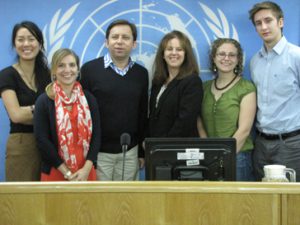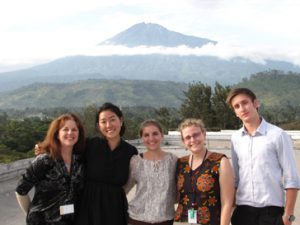
Evelyn Chuang, Marie Hastreiter, Anees Ahmed, Leila Sadat, McCall Carter and Giovanni Bianchetti in the Laity Kama Courtroom at the ICTR
From June 26 until July 3rd I had the privilege of visiting the International Criminal Tribunal for Rwanda, which was finishing its final trial before handing off much of its work to the newly established Residual Mechanism for International Criminal Tribunals (MICT). Indeed, it heard its last witness in its final trial, Prosecutor v. Ngirabatware, on July 3, 2012.The ICTR has now completed trials for all indicted persons other than several fugitives ahead of schedule, and on July 2, 2012, the Arusha Branch of the MICT was inaugurated in a solemn ceremony featuring addresses from the President of the MICT, Judge Theodor Meron, the President of the ICTR, Judge Vagn Joensen, and other dignitaries including representatives of the Governments of Rwanda and Tanzania, Hassan Bubacar Jallow, the Chief Prosecutor of the ICTR and the MICT, and the registrars (or their representatives) of both institutions.
What was perhaps not captured in the formal speeches on the 2nd of July was what the ICTR has meant to so many persons both within and without the institution. The Tribunal has been operating for more than 17 years to bring to justice those most responsible for the cataclysmic slaughter of 1994. Located in the Arusha Conference center at the foot of Mount Meru in the heart of Arusha, at its peak it had four fully functioning modern courtrooms, more than 1000 staff from more than 80 countries, and an annual budget of 140 million dollars. It has become an important institution in Tanzania, not only for the jobs it created, but for the commitment it represented by the United Nations and the international community to peace and justice in East Africa. It took on the role of a vital institution for the region, and proved that a functioning and effective international criminal tribunal could be located in Africa. The Tribunal had many firsts: first conviction for genocide, first jurisprudence that rape could be an act of genocide, first convictions on charges of incitement to genocide, first international tribunal in Africa, etc., etc.

Leila Sadat, Evelyn Chuang, Marie Hastreiter, McCall Carter and Giovanni Bianchetti on the roof of the ICTR Building, with Mount Meru in the background.
Even though the Rwandan government objected to its location outside of Rwanda and to the absence of the death penalty at the ICTR, engendering difficult relations between Rwanda and the ICTR for many years, ultimately the Rwandan government and the ICTR developed a modus vivendi.I also visited the detention center, and was extraordinarily impressed with the thoughtfulness and efficiency of the prison system established. With the transfer of some existing prisoners to Rwanda for trial as well as the cases of several fugitives, the capacity building dimension of the ICTR’s work will remain a critically important aspect of its legacy.Washington University School of Law has had more than a dozen students intern at the ICTR, each of whom has come away changed by the experience.They have worked in Chambers and for the Office of the Prosecutor, and come to know the people of Africa and the commitment to justice and peace that the work of the Tribunal represents. The warmth of those working at the Tribunal, like the warmth of the Tanzanian people, has made their work pleasant as well as instructive; indeed, the hospitality I experienced during my visit was extraordinary. Sometimes working conditions are difficult in Tanzania, but hardship and obstacles are borne with equanimity and a smile.
Rwanda and Tanzania, like other countries of the region, are amongst the poorest nations on earth. As I noted in my lecture on The Legacy of the International Criminal Tribunal for Rwanda, the ICTR has had a profound effect on the local environment, the regional community and internationally. Now it is up to the international community to ensure the success of that legacy through adequate funding of the Residual Mechanism, and making sure that the commitment to the people of Rwanda – and East Africa — continues long after the ICTR’s formal closure.

